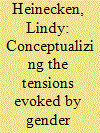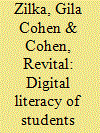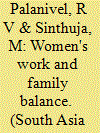| Srl | Item |
| 1 |
ID:
152317


|
|
|
|
|
| Summary/Abstract |
The South African military has adopted an assertive affirmative action campaign to ensure that women are represented across all ranks and branches. This has brought about new tensions in terms of gender integration, related to issues of equal opportunities and meritocracy as well as the accommodation of gender difference and alternative values. The argument is made that the management of gender integration from a gender-neutral perspective cannot bring about gender equality, as it obliges women to conform to and assimilate masculine traits. This affects women’s ability to function as equals, especially where feminine traits are not valued, where militarized masculinities are privileged and where women are othered in ways that contribute to their subordination. Under such conditions, it is exceedingly difficult for women to bring about a more androgynous military culture espoused by gender mainstreaming initiatives and necessary for the type of missions military personnel are engaged in today.
|
|
|
|
|
|
|
|
|
|
|
|
|
|
|
|
| 2 |
ID:
183997


|
|
|
|
|
| Summary/Abstract |
Most academic campuses in Israel are multicultural, with a diverse composition of students. Using a mixed-method, mostly quantitative approach, this article examines the extent to which students’ cultural backgrounds affect their level of digital literacy. The findings show that students in two groups perceived digital learning differently across all seven factors examined: digital information processing and presentation; evaluation of information from the network; data collection and retrieval from the net; digital information management; communication and teamwork; awareness of integrity and ethical standards; and social responsibility. Ultra-Orthodox students perceived the digital environment as a means that enabled them to study, access course sites, and submit assignments. By contrast, students from the general population, with full access to digital environments, perceived access to information and communication technology (ICT) as an end in itself. Accepting cultural differences and different worldviews, will grant students equal opportunities, social mobility, and successful completion of studies.
|
|
|
|
|
|
|
|
|
|
|
|
|
|
|
|
| 3 |
ID:
117600


|
|
|
|
|
| Publication |
2012.
|
| Summary/Abstract |
This article aims to assess the ability of formal equal employment opportunity (EEO) programmes and workplace agreement making in India to facilitate work and family balance for women workers. Using documentary analysis and semi-structured interviews in six Indian organisations that are required to develop formal EEO programmes, it is found that formal EEO programmes and agreement making are limited in their ability to promote work and family-friendly arrangements at the workplace. Informal arrangements and managerial discretion remain important in realising work and care balance. The article highlights thus that formal mechanisms alone cannot achieve effective work and care reconciliation for women workers, mainly because they are built upon limited minimum requirements, are voluntary and are dependent upon bargaining processes at the workplace.
|
|
|
|
|
|
|
|
|
|
|
|
|
|
|
|